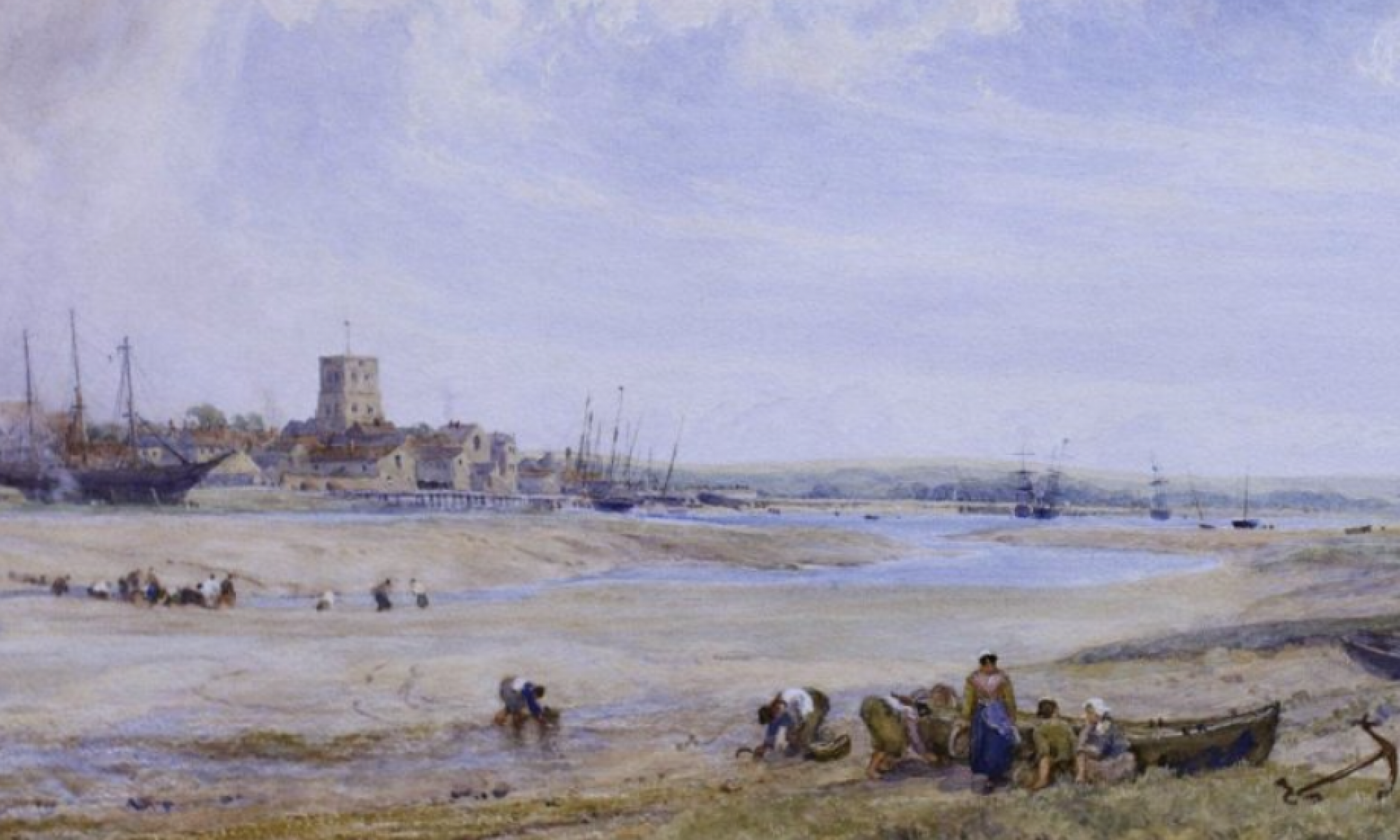The early 19 th century letters of a Shoreham Resident
Contents
Page 1 – 2 Introduction
Page 3 – 4 Letter A (transcript)
Page 4 Letter B ( .. )
Page 5 Letter C ( .. )
Page 5 – 6 Letter D ( .. )
Page 6 – 7 Letter E ( .. )
Page 7 – 9 Letter F ( .. )
Page 9 – 10 Letter G ( .. )
Page 10 – 12 Notes H ( .. )
The Original Papers
Page 13 Front cover, inside front cover and first page (letter A)
Page 14 Second and third pages (letter A continued)
Fourth and fifth pages (letter A concluded and start of letter B)
Page 15 Sixth and seventh pages (letter B concluded and start of letter C)
Eighth and ninth pages (letter C concluded and start of letter D)
Page 16 Tenth and eleventh pages (letter D continued)
Twelfth and thirteenth pages (letter D concluded ad start of letter E)
Page 17 Fourteenth and fifteenth pages (letter E concluded and start of letter F)
Sixteenth and seventeenth pages (letter F continued)
Page 18 Eighteenth and nineteenth pages (letter F continued)
Twentieth and twentyfirst pages (letter F concluded and start of letter G)
Page 19 Twentysecond and twentythird pages (letter G concluded and notes H)
A Small Book of Letters and Notes by William Butler (circa 1816)
This beautifully written book (not much more than a few pages eight and a half by six inches sewn together ) discovered recently under the floor boards during renovations at No.22, Church Street transpire to be the writings of William Butler whilst serving on board the Revenue Cutter ‘The Hound’. The Butler family of that time is vividly described in detail by Maria Butler in her history of that family shortly before her tragic death at 27 in 1857.There were possibly more than two William Butlers from Shoreham living at this time but the most likely candidates were baptised in 1760 and 1795. The former, who would have been 56 at the time, is not seriously considered to be a candidate for the author of these writings (A) in view of the author’s exploits which will be revealed later (although it could have been possible), and (B) because he is not mentioned at all by Maria in her notes. Furthermore, since his baptism, this older William does not appear again in the parish records, even for burial, so it is assumed that he had moved away and died elsewhere.
The younger William’s father, John Butler, a mariner towards the end of the 18th century and the early 19th, was famous for his exploits as captain of the ‘The Hound’ with his other brother Harry as first mate (the latter lived in the same road at No.11 which is also still standing). No.22 Church Street was built by John’s father and passed to him in 1813.
Undoubtedly William spent some time at No.22 and in 1817 whilst in the Hound he would have been 21 years of age but probably went to sea some time before then. It would be interesting to know if he actually sailed with his father and uncle in the cutter but searches at the Public Record Office at Kew, London of the Customs & Excise records have so far failed to produce any information at all. The census returns of 1841 and 1851 also make no mention of this younger William so he had probably moved from Shoreham by then as well.
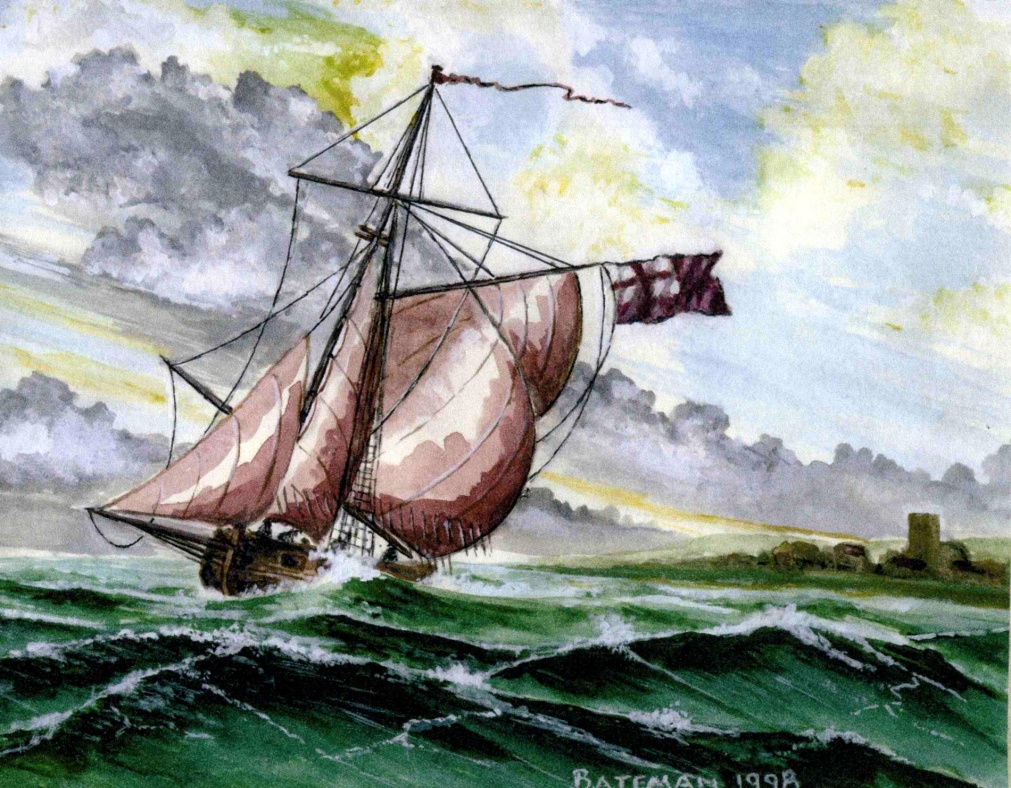
William’s letters and his later notes have been transcribed with numbered explanations where the meaning of certain words and phrases may not be totally obvious. Facsimiles of the original pages themselves are included at the end. Rather than disclosing everything at the outset each letter is separately analysed so that a picture may be built up, both of William and the situation he finds himself in. The writings are not a particularly important revelation in themselves and some of the letters are little more than a lover’s ramblings but they do relate to a member of one of Shoreham’s most illustrious families historically and some mention is made of other people and places in the town. At the end of the day they are just letters of love and although these are in the main courteously written it is pertinent to warn that his final notes are crude in nature.
The grammar, spelling, punctuation (or rather the general lack of it) and the use of capitals in places where they should not be are shown exactly as they appear in the original letters. They will make more sense when capitals are ignored (in most instances) and the beginning/end of each apparently continual sentence is stopped/started at the most meaningful point e.g., ‘….of my Sincerity beg that day of happiness may be soon my Offections never so much….’ – one sentence ending at ‘soon’ and the next beginning with ‘my’. Finally, age has almost obliterated the writing at the foot of each page and where such wording is indecipherable each word is represented by ‘………’
Roger Bateman
Shoreham
2001
Letter A
Hound Cutter at sea
Mifs
Pardon me Mifs that I may be one of the Rest of your adorrers 1 that you shall have the Least Spark of love left in your heart for me for Dear I can never rest until you do it I was in some hopes to Gain a littel of your Love but now I have given all Hopes over unlefs you may alter your mind which will be Greatlee to my satisfaction for Dear Mifs if you knewe the pain I have gott in my heart for you you wold never be so Cruell as to refuse me Dear Mifs for by that means I must still call you has Cruelty entered your mind nature has some Desing 2wretch has imposed on you cruelty My Dear I am neither false nor deceitful but I am afraid you have been imposed on by some Designing 3person who had private views and private ends to answer for this falsehood but whatever may be the cause I am entirely innocent and to Convince you of my Sincerity beg that day of happinefs may be soon my Offections never so much as wandered from the Dear object of my love in you are all my hopes of felicity with you only I can be happy keep me not in misery on moment longer by the entertaining Groundlefs Jealousies against me who Love you in manner …… ……. …… of your sex and I can set at Defiance even Malice itself let me beg and swer 4which will either make me Happy or Miserable
1 ‘adorrers’ = adorers or admirers
2 ‘desing’ = not apparent in meaning although the word used in 3 may suggest that William simply misspelt the same word.
3 ‘designing’ = cunning
4 ‘swer’ = swear or promise
This, the first letter in the collection , is at first sight extremely polite and gentlemanly with the title ‘Miss’ being given to the recipient as either a courteous address or perhaps a pet name. However, the eye immediately falls upon the words ‘…I can never rest until you do it.’ – do what – love him? Perhaps, but although decorum at first discourages any modern day interpretations of this, the benefit of hindsight (having already read all the writings involved) provides a strong indication that this means the sex act itself.
To put things more into context, the period concerned was long before the prudish constrictions of Victorian times and was still a time when morals were probably akin to those of today. For example in not too distant Folkestone at that time, itself also a seafaring community, family life appears to have broken down in many instances. Men were loath to take on the responsibility of marriage unless forced into it and the number of illegitimate births far exceeded legitimate ones. The town’s vicar, exasperated at the condition of most of the brides he married, offered the reward of a teapot to ‘such females as came to be married in the virgin state’ – it was claimed only once in nineteen years!
From the wording that follows thereafter it would appear that William has been told by the object of his affections, probably during a previous meeting, that his advances are not required and that he has been guilty of something that has obviously upset his female friend. This has been influenced, as William would believe, by the interference by another ‘designing person’ who has stated some falsehood about him. He goes on to claim complete innocence of the accusation and mentions ‘groundless jealousies’ which must surely imply his dalliance with another lady.
The meaning of the words ‘of your sex’ towards the end of the letter is difficult because the preceding words are indecipherable. Rather than do an injustice to William and be led by what he said in the first sentence, it is only fair to assume it is some polite allusion i.e., to the gentler sex.
For some reason William did not sign this particular letter.
Letter B
Hound Cutter at sea
Mifs
Love and Affection has induced me to sit down and write to you the following lines hoping they may come safe to hand and find you in perfect health a blysing 5 I at present enjoy My Dear allow me to say that since the last day I had the pleasure of seeing you …… thoughts has caused me uneasinefs of mind being very anexious 6 to have little communication with you by ways of letters if you have not aney Objections to my request , and are not particularly engaged with any other person if you are; I beg you will look over 7 my boldnefs in taking the liberty of writing unto you, I must acknowledge that I am almost an utter stranger toyou as yet and you to me, for this reason I will not mention my Particulars at present …… entreat that ……. …. ….. to favour me with a few lines as soon as you can make it convenient therefore I will endure for this time , and only say at present my heart is Single and my undertakings and designs are sincere neither do I wish to take the least advantage of you or any other person , nor act in any way of deceit , by no means ; I would scorn the action So I remain with great expectation of an answer your Affectionate Lover and well wisher.
Wm. Butler
5 ‘blysing’ = blessing
6 ‘anexious’ = anxious
7 ‘look over’ = overlook
Apparently, not having received any communication from his lady, William is now seeking to persuade her to write to him. It seems they are relatively unknown to each other (‘…. I am almost an utter stranger to you as yet and you to me….’) which makes the previous reference to ‘doing it’ in letter A all the more surprising but because of the morals in those days perhaps the wish to have sex with a woman was deemed to be flattering?
Williams’ apparent overly courteous way of writing may have been typical of the time but to our eyes it perhaps seems a little too sickly. This in turn tends to lessen the impact of his plea of innocence and his wish not to ‘…take the least advantage of you or any other person, nor act in any way of deceit…’ doesn’t quite ring true.
Letter C
Hound Cutter at sea
Mifs
Upon my not receiving an answer to my last, 8 I am Constrained to send you the following lines being doubtful the other did not come to hand, 9 you requested me to give you a Satisfactory account of my leaving all correspondence with a young girl that has lately left Shoreham being somewhat parlous 10 of the Sincerity of my undertakings , I instantly Complied with your request , informing you that on various occasions I found things not altogether according to my wish and ….. that I thought it better to part immediately , and not hold each other in suspence any longer , which I did and I have determined not to hold any communon 11 with her again. Mifs I hope what I have said to you you will not take amifs , and at the same time may this declaration suffice you for the present I cannot but say the person that can boldly give to another his (or her) hand , without the secrets of their inward mind inclining them thereunto are deceitful ,that may I never acted a base part I hope were this …… love , there is not any particular and Consequently no happiness existing between the parties have the goodnefs to favour me with a few lines from your own hand and let me know your thoughts on the Contents of this . So adieu for this time my Dear and believe me to be yours and Sincerely .
Wm. Butler.
8 i.e.’my last letter’
9 was not recieved
10 ‘parlous’ = seriously doubtful
11 ‘communon’ = communion or communication
Now we learn what all the fuss is about. Still not having heard from her, William is again writing and this time spells out what had troubled the lady in the first instance. It seems that, as the first letter indicated, his name had been linked with another girl who had since left Shoreham. The reference to leaving all correspondence with a young girl could mean ‘leaving off’ or ceasing all correspondence with her or perhaps literally leaving or showing all his letters to the other girl – a highly embarrassing situation for her.
Having explained this to her in the letter William again asks for her reply and to know what she thinks of his explanation
Letter D
Hound Cutter at sea
Mifs
Having a few spare moments at the present time I with eagernefs embrace the opportunity of troubling you once more with a few lines , hoping …. you in perfect health, as I have the pleasure to inform you this leaves me at this juncture I cannot say but I find a very great uneasinefs in in my mind , that you seem to find in writing to me ; I think it planley 12 implies a coldnefs in affection the reason for which I desire to know , as I cannot charge myself with any inconstances 13 toward you, unlefs it be this that I might not have visited you so often with my Poorly presence , as you might have reasonably expected , or …… ……. ; I beg to be excused , and there are many things that naturally occur in Life which cross us in our intentions , another reason for your not writing unto me might be this , which I have (and do now) often feel in my own breast, (that is) least the person to whom I write should not wish to have any Communion with me , either by Letters or in person , should at length expose me Openly to others , or indeed to this particular acquaintance I …….. in showing my letter that I might have written to them in the integrity of my heart . My Dear I do not attempt to …… ……. this , no , by no , means , Neither would I have you harbour the least thought of this Concerning me , for I would absolutely scorn the actions for if I did not find myself inclined to walk or converse with a person or rather if I had not a real regard for them in my heart and respect them before another , I would entirely for sake and abandon their Company and also desist from writing unto them. My Dear I remain for the present looking with earnestnefs for an answer to this , may you enjoy peace and prosperity and be blesd 14 in all your undertakings the Sincere desire of your affectionate friend and Lover
Wm. Butler
12 ‘planley’ = plainly
13 ‘inconstances’ = inconsistencies
14 ‘blesd’ = blessed
Still no reply and this time William seems to have got the sulks as he petulantly writes that the lack of response from her indicates ‘…. a coldness in affection ….’ and insists he is blameless. Perhaps she feels that he has not visited her enough.
Now comes a devious threat in that he tries to place himself in her shoes and asks, in a roundabout way, if the reason for not writing is a fear of him showing her letters to him to someone else. Immediately after this William goes to great pains to reassure her that he would not ’….have you harbour the least thought of this concerning me…’. There follows a whole string of flowery reassurances that he would never entertain such action but he has nevertheless succeeded in having sown the seed of doubt.
Letter E
Hound Cutter at sea
Dearly Beloved
I received your kind letter yesterday morning dated 14th inst. and was happy to find you so ready and willing to Comply with my request , upon an evidence of the truth of what I informed you in my letter. you speak of being doubtful of my sincerity and that you wish me to give a satisfactory information therein . I must acknowledge thus far , that I was somewhat Concerned about a young person that lately departed from Shoreham , and I had a little Communication with her for a while, but finding her not altogether suitable according to my desire I have lately bid her a final adieu So that from henceforth I do not intend to have any Correspondence with her If you think this is not a mark of my Sincerity will you pray what way , or in what manner shall I express myself unto you My Dear I hope this may be Instrumental of removing your distracted doubts , and may all jealous thought be drowned with love ; is my earnest desire
I Conclude for this time (in expectation of another from you) yours Sincerely, till death ; I hope , in trust ;
Wm. Butler
It worked! At last William has received a reply indicating that the object of his desires was ready to write to him but with the condition ‘….upon evidence of the truth of what I (William) informed you in my (last) letter….’.
There is no indication of anything more than that but William seems to have let it go to his head as he now addresses her as ‘Dearly Beloved’!
He then admits to being concerned himself ‘…. about the young person lately departed from Shoreham….’ and goes on to confess having communication with her but that whatever the relationship was, was discontinued when she left after William found her ‘…. not altogether suitable according to my desire….’ – something of a pompous statement , presumably hoping to impress.
He then again makes the same mistake as before in suggesting that his new found ladylove is jealous i.e.,’…. may all jealous thoughts be drowned with love…’ – a somewhat arrogant comment and guaranteed to offend anyones pride, especially if her reason for writing was not to encourage the relationship but to secure some reassurance about the letters she had already sent to him.
Nevertheless, William is obviously in a state of near euphoria as not only is she now fondly addressed but his closing affectations read:- ‘ … till death, I hope, in trust …’
Letter F
Hound Cutter at sea May1st
15 Dear Louisa
I received your letter dated 23rd inst.16 and am very sorry to find such disorder and discontment 17 resting between you and me , but My Dear acknowledging you to be subject to unruly passions as naturly dwell in every human breast . I must say that I have written somewhat perversely unto you of late but believe me when I say , I did it unadvisedly upon reflection of which I find great uneasinefs , and remorse of mind , in accusing you , with that , which you are not , neither do I, justify myself therein , which I hope upon my acknowledging my fault unto you , you will look over my offence , and please to ……. me my faults wherein I have so greatly offended you , faithfully promising never to act so base a part again , my meaning in writing as I have unto you was in part this – not that I doubt of your real affection toward me but to find your letters so very short that I could not draw such satisfaction from them as I would wish , or as I thought , I might have sent you in mine If I have judged wrongfully here in I beg to be excused my dulnefs of apprehension respecting the remedy that you speak of to prevent …… ….. … between us I cannot think of performing unless you absolutely compel me for I am persuaded where there is a real concern in the heart for any person , it is not so easily put away or forgotten . I am very sorry to find that you should encourage such uncharitable thoughts of me , as to think that I could part with the correspondence from you with a cheerful heart , or to doubt of the sincerity of all that I have here to for written unto you , but I hope you did it not intentionally as I know by experience we are all apt to err at times I must say that that my dispersition 18 is to look over all such weaknefses – as – I hope (you from my heart) will do the same . And from this time , all that as been amifs I hope you are willing to let pass by and may it never be remembered by either of us again And were discord and contention has in part reigned , may Love and unity reign in each of our hearts one toward the other may not a single rival again rise but unfeigned affection that may cause ….. and gladnefs consequently unity , peace , and concord will take place on both sides this I trust is the particular request and desire of your unworthy but loving and affectionate friend
With Submission
Wm. Butler
15 the first indication of a date, but still no year
16 short for ‘instant’ which is, of course, the present month. William must mean ‘ult.’ or ‘ultimo’ meaning the previous month (April) because he is writing on the 1st May . ‘The Hound’ was based at Rye and one assumes that letters to William were sent there so it is interesting to see that it took about a week for him to receive this one – probably less if there was any delay in sending/replying.
17 discontment = discontentment
18 dispersition = disposition
We now know the lady’s name but, being only the christian name, it would be an almost impossible task to identify all the Louisas living in the town then from the comparative lack of records available to us.
It’s easy to say I told you so but it is surely no surprise to learn that the letter of reply was apparently near exploding with outrage – ‘ … sorry to find such disorder and discontentment resting between you and me …’. Whilst only a young man, William has nevertheless already displayed some arrogance in his writings to which must now be added some naivety in matters of tact. However, he does display some admission of his lack of nicety by admitting to have previously written ‘somewhat perversely’
The question of Louisa’s previous letters to him also arises again and it looks now as if she wishes the situation to be resolved by him returning them to her . However, William resists this ‘ .. as to think I could part the correspondence from you with a cheerful heart….’ and ‘..respecting the remedy that you speak of…..’; ‘….I cannot think of performing unless you absolutely compel me…’
His apologies for having ‘written perversely’ are somewhat rambling and you can almost imagine him as if he were personally confronted by his accuser, pleading awkwardly for forgiveness ‘…. I find great uneasiness and remorse of mind…’; ‘…. I hope upon my acknowledging my faults unto you, you will look over my offence…’ and, refreshingly, a humble ‘… I beg to be excused my dullness of apprehension ….’.Nevertheless, game to the last, continues to display his arrogance (or perhaps naivety to be fair) in continuing to assume her desire for him ‘….not that I doubt of your real love and affection for me ….’
We, of course, are unaware of the exact content of the lady’s letters and whether or not she gives any hint of affection in them but from what William says it sounds unlikely. The fact that she has requested the return of her letters must surely indicate that she no longer wishes to be involved with him. Nevertheless, undaunted he continues to plead for their relationship asking:- ‘…I hope you are willing to let pass by and may it never be remembered by either of us again…’ and ‘…may love and unity reign in each of our hearts one toward the other…’ etc.,
Poor William, trying very hard and using all his persuasive writing abilities to turn on the charm he still manages to shoot himself in the foot. Even in times like then when the men were generally accepted (at least, accepted that is by themselves) to be the superior sex, any condescending remarks were probably taken by them to be kindly intentioned but surely, even then the following comments must have caused some offence :- ‘…. acknowledging you to be subject to unruly passions ….’.
Letter G
Hound Cutter at sea
Dr. Friend
I once more embrace an Opportunity of sending you a few lines thinking this may be the last for some time as we expect orders daily to go to Debtford with our Cutter to refit . I hope you will not think it strange if you should not hear from me for the future so often as heretofore , not that I have any objection in writing unto you , My Dr. I think it will be very expensive for you if I should write often from London , therefore I hope you will keep your self single in heart , after my departure , as I believe you have you have hitherto – I do not expect an answer to this being fuller satisfied with the undoubted reason you gave me the last time I had the pleasure of seeing you I have been favoured with the liberty of a few days lately which I had the pleasure of spending among my friends and Relations, I have nothing else particularly to say at present please to forgive my short letter And I hope after my return we shall enjoy a few days together if agreeable to you and you find things convenient
I remain yours
Sincerely
Wm. Butler
Things certainly seem to have cooled down by now ‘Dear Friend’ rather than ‘Dearly Beloved’ or even ‘Louisa’. Without a date on the letter it is difficult to know if this was written shortly after letter F during Williams’ same period at sea but it does seem that a period of leave had come up in the meantime when they had met again as he says ‘..I do not expect an answer to this being fuller satisfied with the undoubted reason you gave me the last time I had the pleasure of seeing you…’- apparently, William had visited her enabling a face to face discussion. He also hints that he will not be writing as much as before although hastening to qualify that with the condescending words ‘…not that I have any objection in writing unto you….’
However, William still seems to be hopeful of something more than just a friendly relationship ‘…I hope you will keep yourself single in heart….’and anticipates another meeting ‘…I hope after my return we shall enjoy a few days together if agreeable to you…’ He was not expecting an answer to this latest letter having been ‘…. fuller satisfied with the undoubted reason you gave me the last time…..’ so as well as Louisa hitherto requiring explanations from William, he had also required answers from her – probably as to the reason for not writing or writing very little.
Nevertheless, in this letter William lacks the ardour of his previous writings and one imagines the romance (if it were ever any more than just a crush on his part) faded out as he did not marry Louisa. What is interesting here are the two references to his expected destination and the postal service of the time:-
‘Debtford’, where the Hound was expected to be heading for a refit, is undoubtedly Deptford on the south side of the Thames, next to Greenwich and opposite the Isle of Dogs. Was this the Revenue’s own depot of the time, one shared with the navy or just a one off privately arranged refit?
He makes the albeit, honest, excuse that for him to write to Louise from London would be too expensive for her (although he didn’t appear to worry about that before as writing from the Hound via Rye would surely not have been much cheaper) but why for her? These were the days before the Penny Post of 1840 when, for example, the rate to send a letter from London to Brighton was 8d, a considerable sum then and the receiver, not the sender, had to pay!
Notes H
The first time I had Connections with Mary Collins was on the 30th January 1816.
On the 16th of October first time I had Connections with Sarah Fillaps at the Founting Shoreham J.Butler Lanlord up in Edwards room
On the 20th of January up in pour new shop at the lower hend of the town at 11 am but she would not let me because she sid she could not stand it therefore I shot it all over her belley.
These notes are written immediately after Williams’ last letter are in the same hand and are virtually as neat in the same copperplate style of the time. A little shocking though they may be in their coarseness and arrogance they seem a little less unacceptable when it is appreciated that they are the writings of a very young man who seems to have been relatively immature in many ways. They are, of course, a victory tally of Williams’ amorous conquests!
Nevertheless, they do provide us with other interesting facts. The first of the ‘connections’ as William puts it, is shown with one Mary Collins the date of which provides us with the only time a year is given – 1816. It is just possible that this might be 1810 but that would have made William 15 or less which, although feasible that one so young could have served on a ship at that age then, it is most unlikely that the Revenue itself would have encouraged this. (It is surely also unlikely that a 15 year old would embark on such amorous activities – perhaps not?) January of 1816 is the month entered by William and although the next conquest has no year one assumes it is October of the same with the final one in January of 1817. The dates of the letters themselves are less certain. Although they precede the ‘rude’ notes and were almost certainly written before them, the events mentioned in the notes could well have happened before the letters were written. Whatever the date, it is surely around the 1817 period.
The relationship with Sara Fillaps (almost certainly Phillips, given William’s obvious lack of spelling ability) even provides the places – the Fountain Inn (Founting according to William) and the ‘pour new’shop. The Fountain, of course, stood just east of where the Bridge Inn stands now and William, somewhat perversely, seems to relish the fact that a relative of his was the landlord at the time and that the act took place in ‘Edward’s room’! Most likely this was his uncle, born in 1780 and also named John like his own father, who himself had a son Edward. The ‘pour new’ shop is something of a mystery – could it have been a corruption of the French for ‘for us’(i.e ‘pour nous’) which tells us nothing; or ‘for new’(e.g. old items/clothes etc., for new – provided, of course, there were enough of the old items for the shop to warrant the transaction);or maybe it was the local name for a pawn shop? Whatever, we are told this shop stood in the lower ‘hend’ (end) of the town and as the low land to the east of East Street in those days was virtually devoid of any building, we are left with the western end at Ropetackle which we know was even then a fairly run-down area.
Was either Mary Collins or Sarah Phillips the ‘young girl’ referred to by William in his letters? We shall probably never know as a check of the parish records reveal no persons or families of those names of the period and this was still some twenty-odd years before the first census that could have identified them. At a time when the population of the town was only 800, many of Shoreham’s residents were itinerant mariners and others involved with the seafaring trades who, with their families, moved from port to another to follow the work available. Perhaps these two girls belonged to such families – at worst, if they made a living by their sex, then they also are likely to have moved from town to town looking for ‘opportunities’.
Why copy these letters into a book? These are not the original letters bound up but written into an already made up blank book with each letter ending and beginning on the same page as it’s predecessor/successor. In his third letter, William actually states ‘Upon my not receiving a reply to my last….’ indicating clearly that his previous missive was indeed despatched. Furthermore, he appears (eventually) to have exacted a reply. Despite the obvious care in which the writing was penned (one would have thought a copy would have been scribbled) it must therefore be that the letters are copies of the ones he sent. In fact it was indeed common practice in those days for copies of correspondence to be taken because of the long delays of a none too dependable postal system. Furthermore, unless he was a wildly imaginative person and had only lived these experiences in his mind (which has to be very doubtful) it must be that he was so concerned as to the intricacies of the dilemma between himself and Louisa that he thought it best to record them in order to prevent his confusion when writing next. In other words it was only a notebook to which he added his conquests immediately after the last letter!
Why did he sign them? The letters were certainly of a very personal nature and he must surely have made sure that he did not leave them lying about– he knew they were his writings but with his name clearly shown so would anyone else if they happened to come across them. Although written at sea the book was obviously brought home by William when on leave, bearing in mind where they were found. The fact his own family would surely recognise his own handwriting may have led him to think it made no difference anyway. Perhaps it is simply that he gave no thought at the time to this possible problem and automatically copied everything verbatum.
We know little more of William as, in her history of the Butler family, Maria Butler relegates him to a minor role and makes little mention of him except to say that he was born in 1795; married in 1831 to Eliza Aldridge and sired three children –this being confirmed by the parish records.
Poor William seems destined to be judged for posterity by these, his writings, but in part justification of them it is only fair to remind the reader of the morals of those times. On the other hand Maria’s own writings of William’s father and mother candidly states ‘Few of their children were worth of them, inheriting as they did the weaknesses of intellect of the Boyces (the mother’s family) with much of their good looks and their father’s temper without their ability’ – is it reasonable to imagine that this seems well fitted to William?
One thing has to be fairly certain. The discovery of the papers almost 200 years later found them in such a condition to suggest that they had been rolled tightly, probably to enable them to be pushed through some narrow opening in the floorboards. Fear of their discovery it seems, particularly by parents, had prompted their secretion by William himself!
Roger Bateman
Shoreham
May 2001
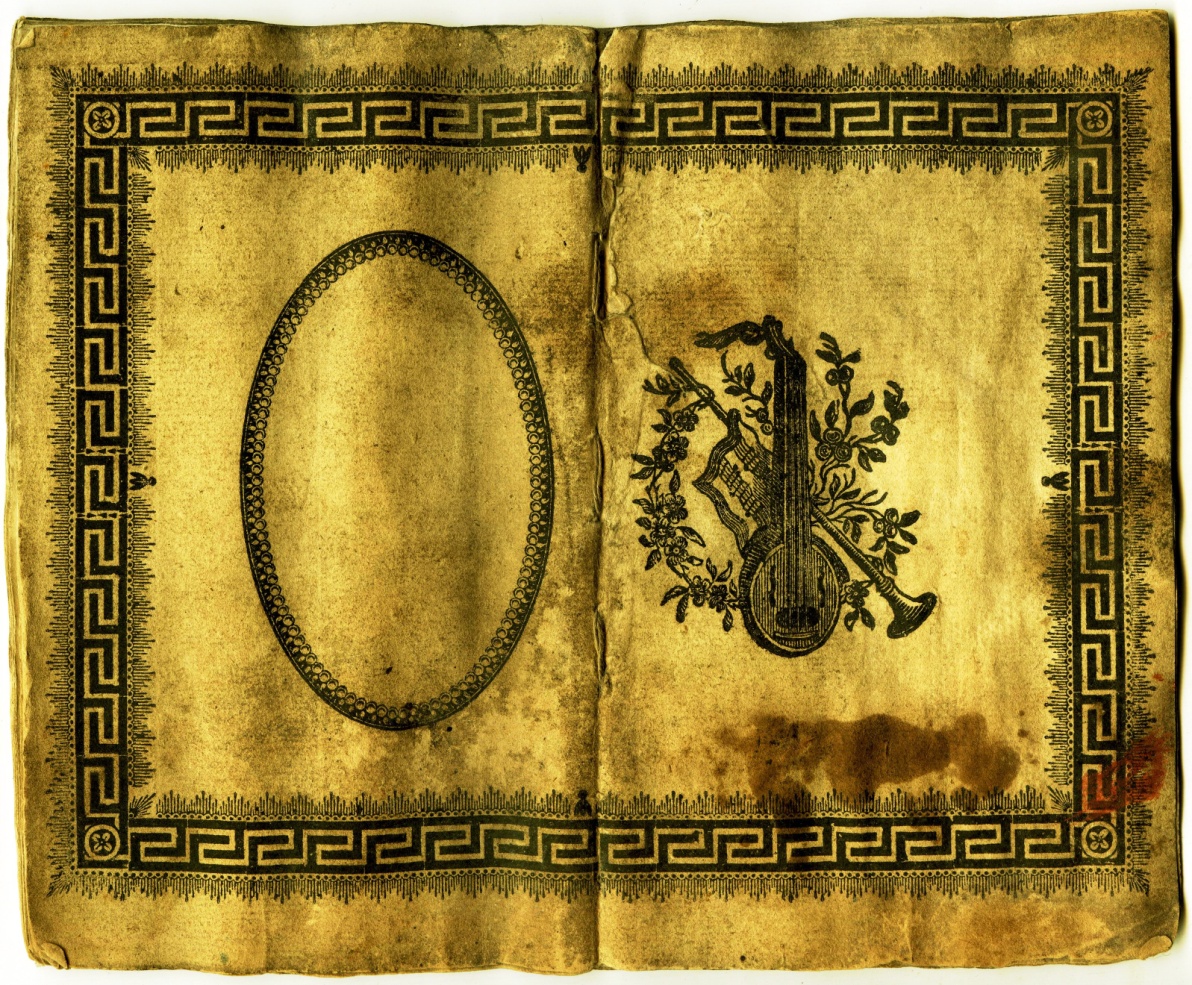
The Cover (8.5 x 6 inches)

Inside front cover and first page (Letter A)

Second and third pages (Letter A continued)
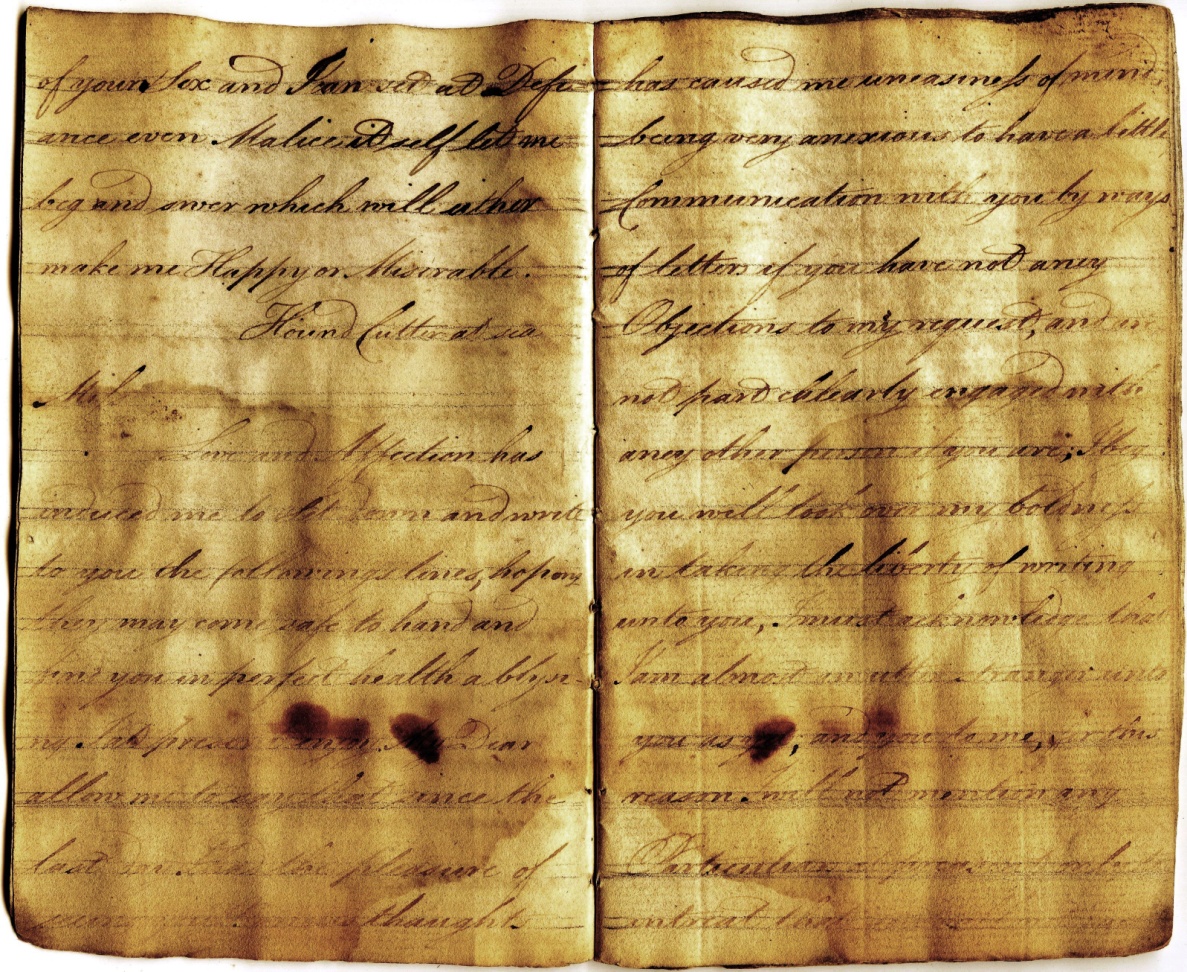
Fourth and fifth pages (Letter A concluded and start of letter B)
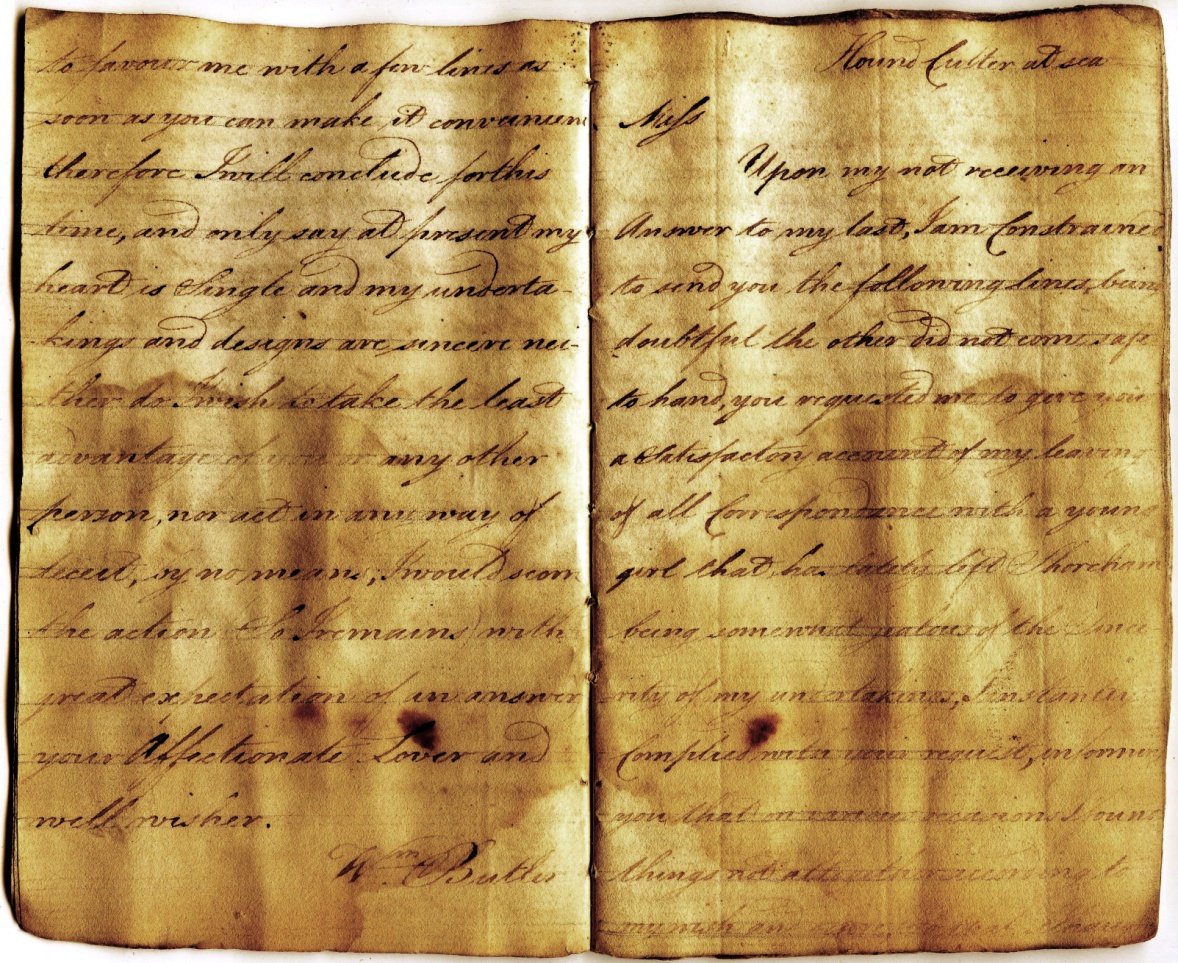
Sixth and seventh pages (Letter B concluded and start of letter C)
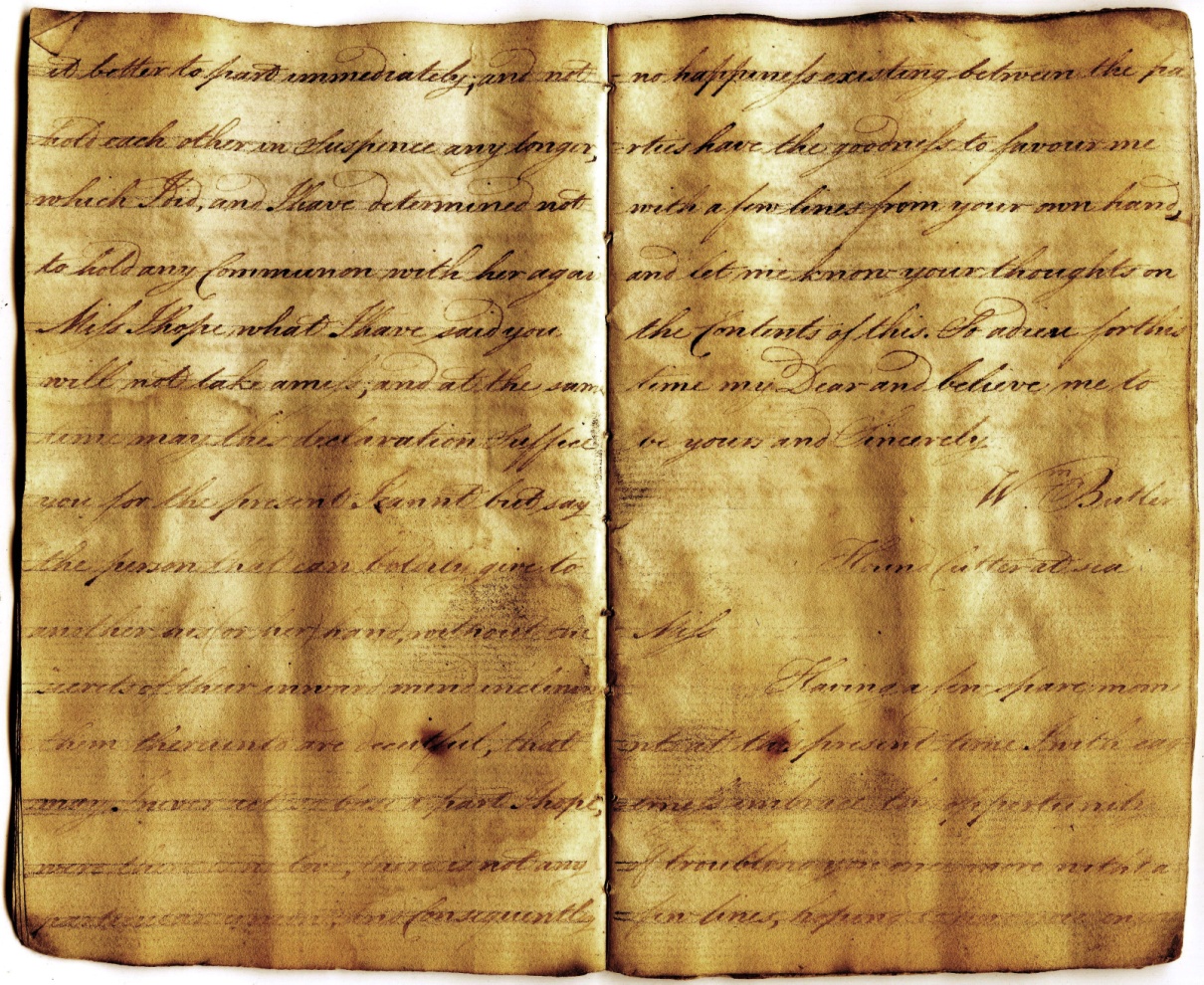
Eighth and ninth pages (Letter C concluded and start of letter D)
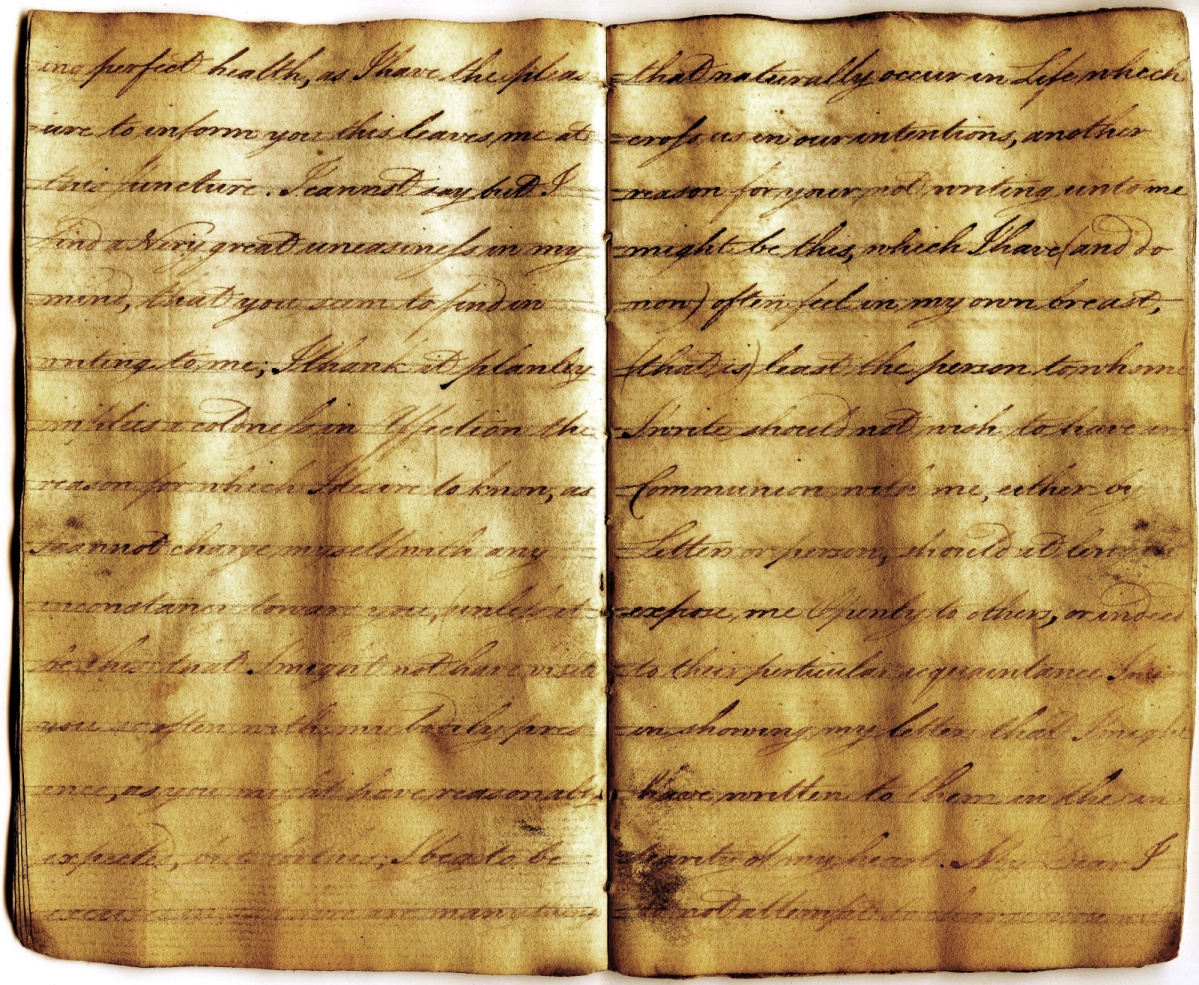
Tenth and eleventh pages (Letter D continued)
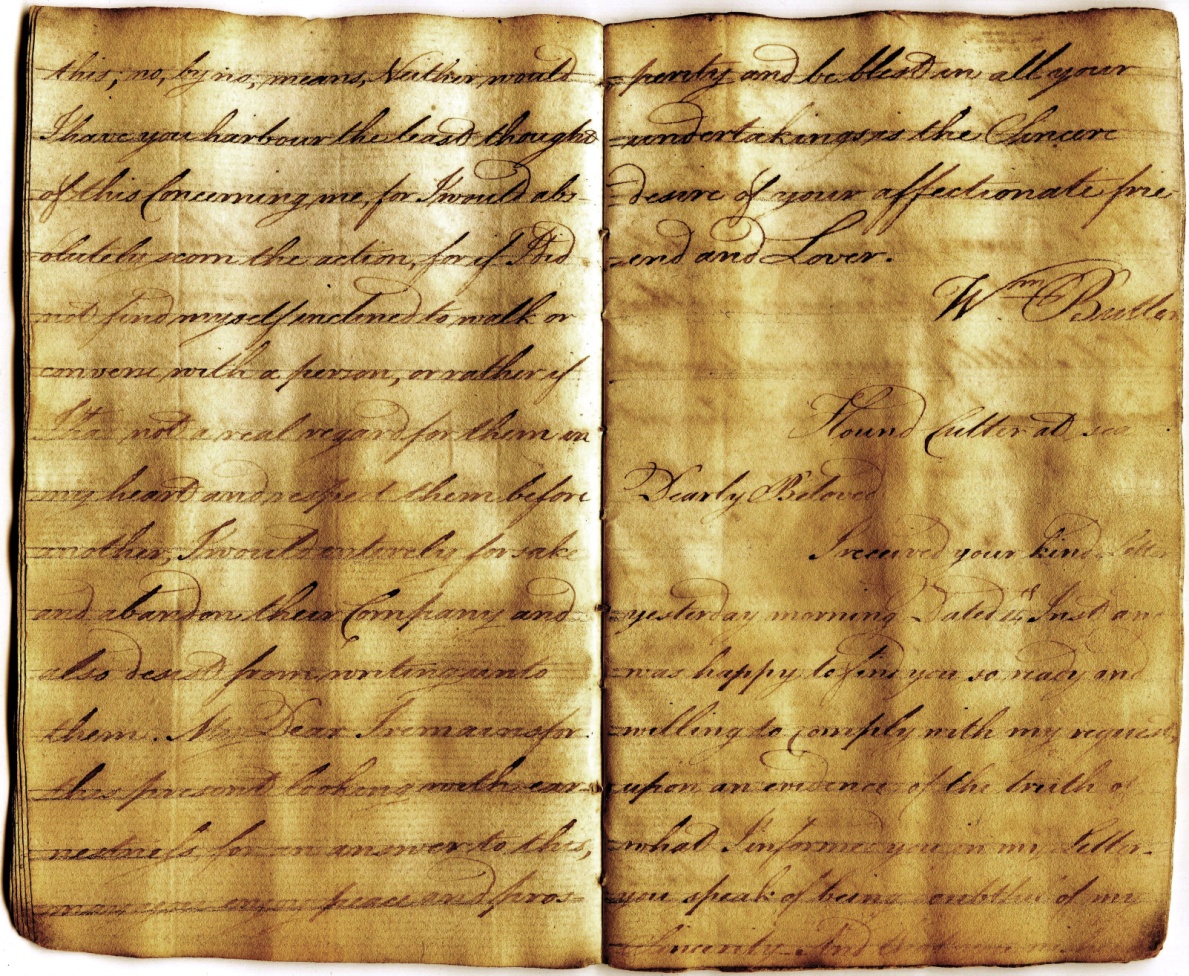
Twelfth and thirteenth pages (Letter D concluded and start of letter E)
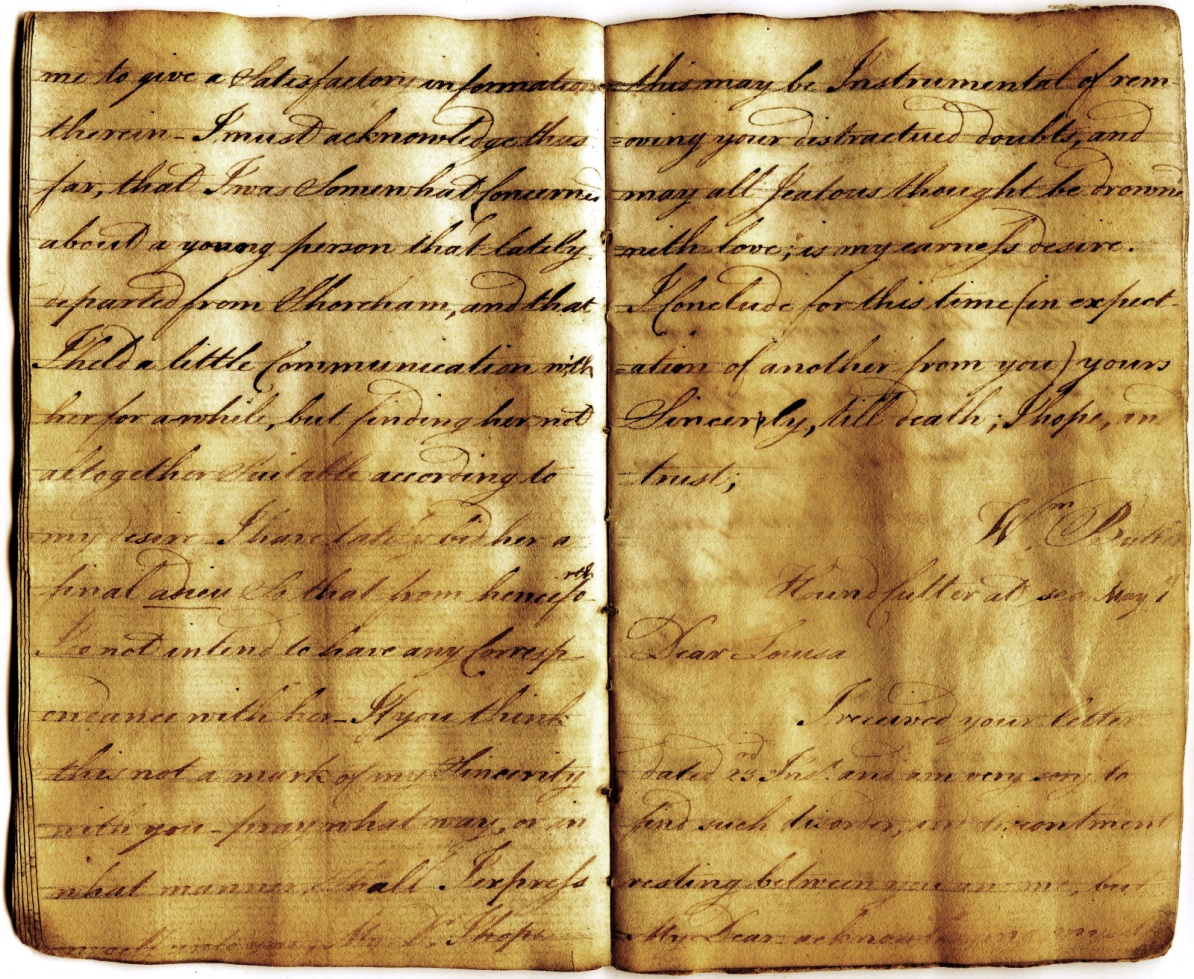
Fourteenth and fifteenth pages (Letter E concluded and start of letter F)
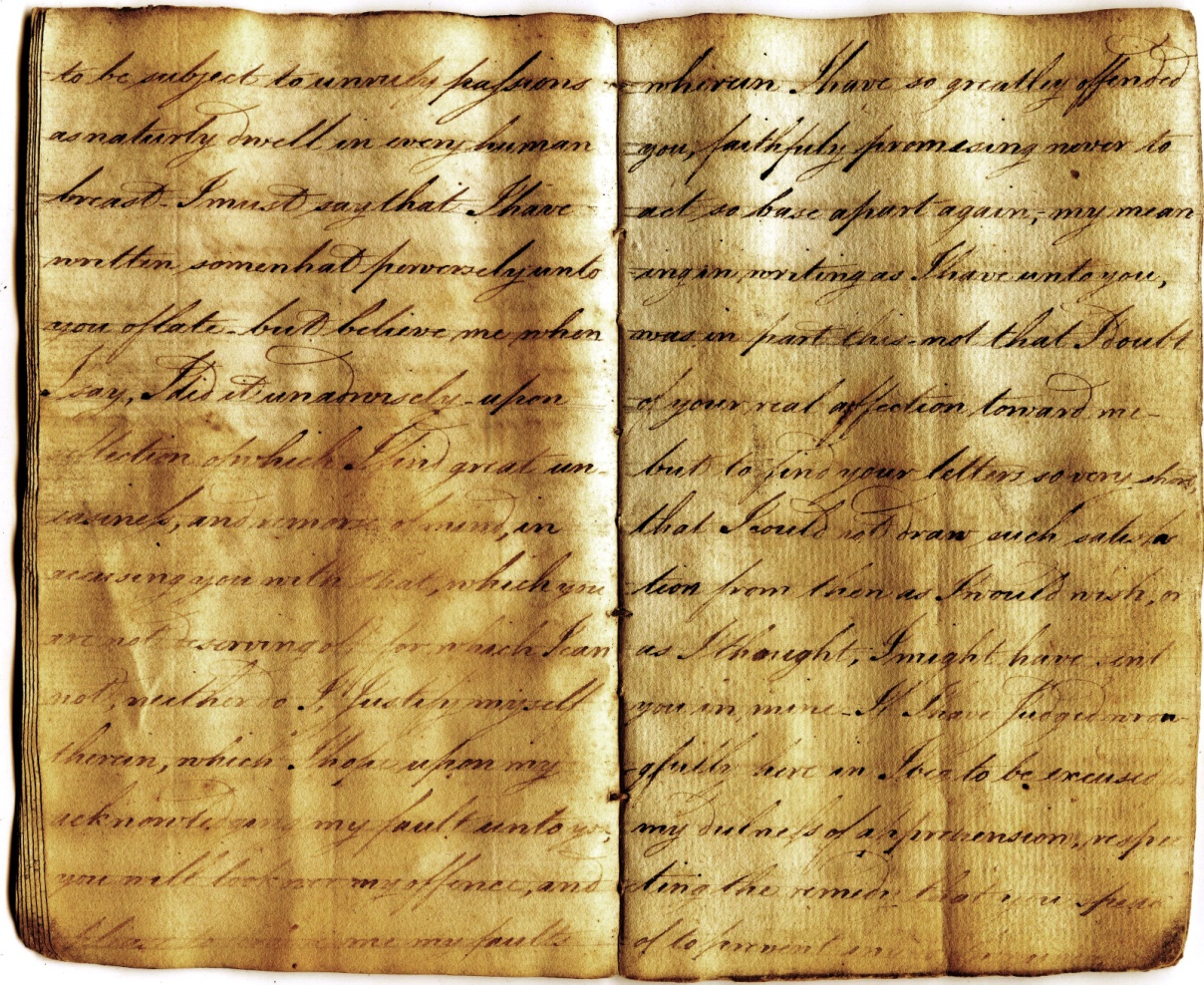
Sixteenth and seventeenth pages (Letter F continued)
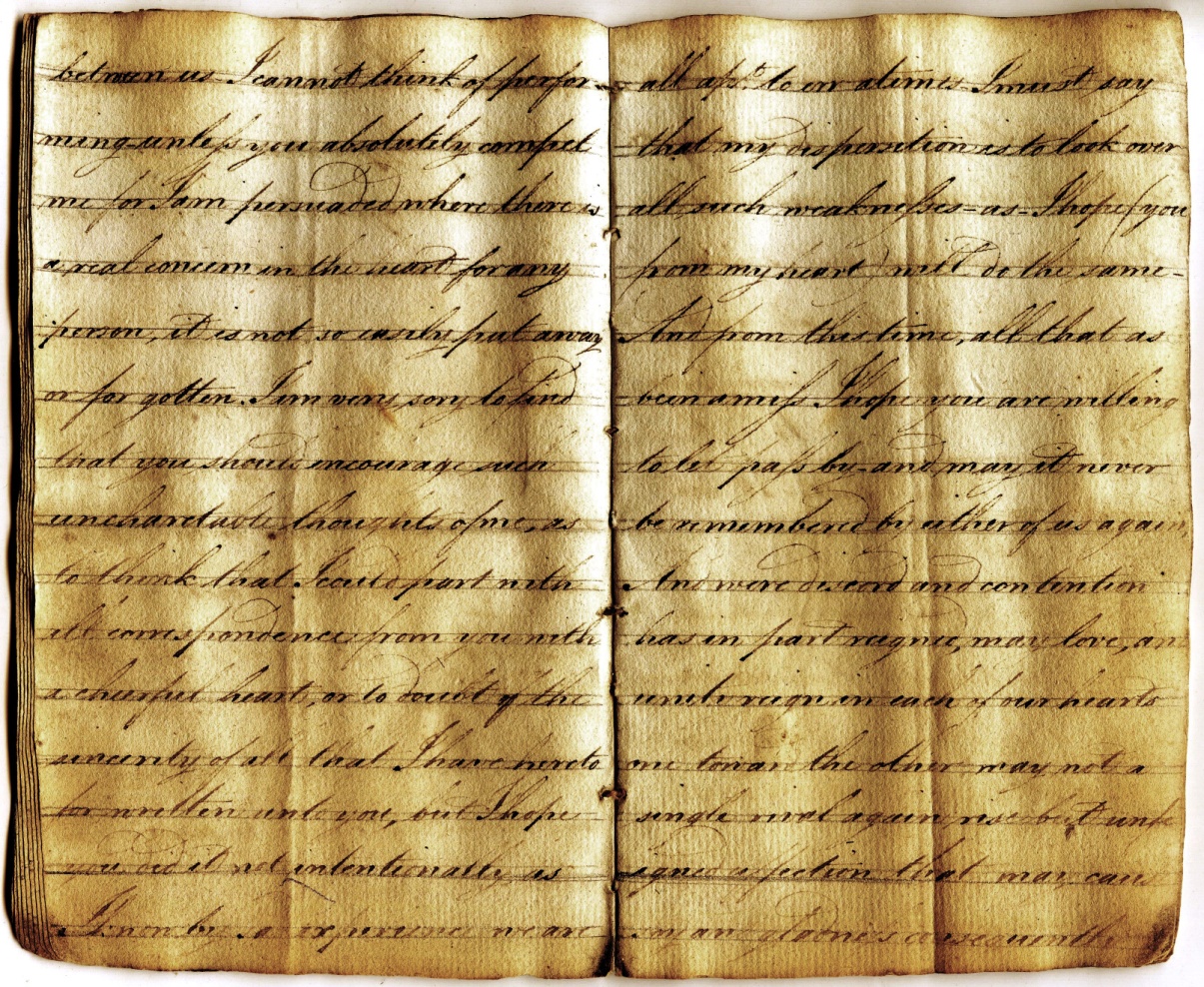
Eighteenth and nineteenth pages (Letter F continued)
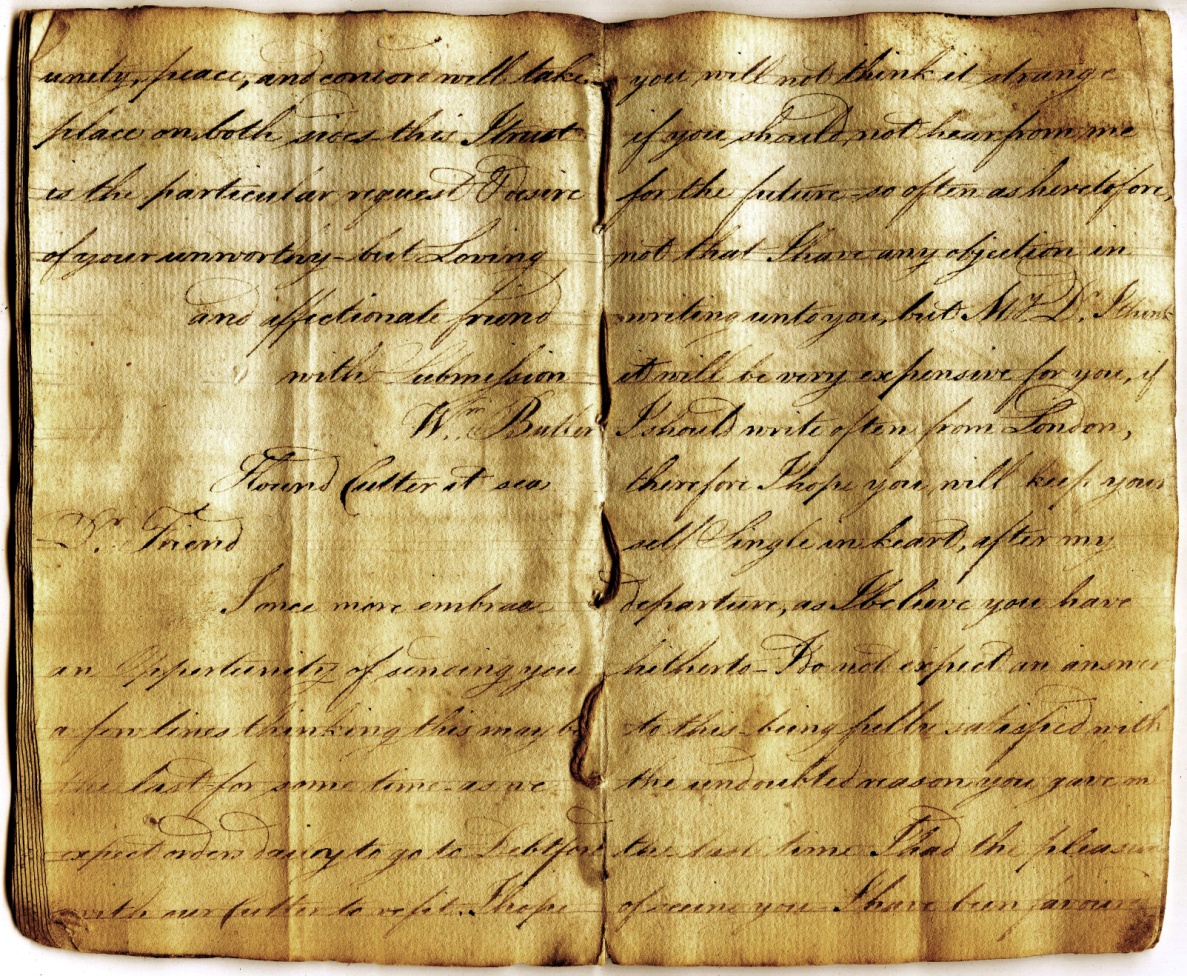
Twentieth and twenty-first pages (Letter F concluded and start of letter G)
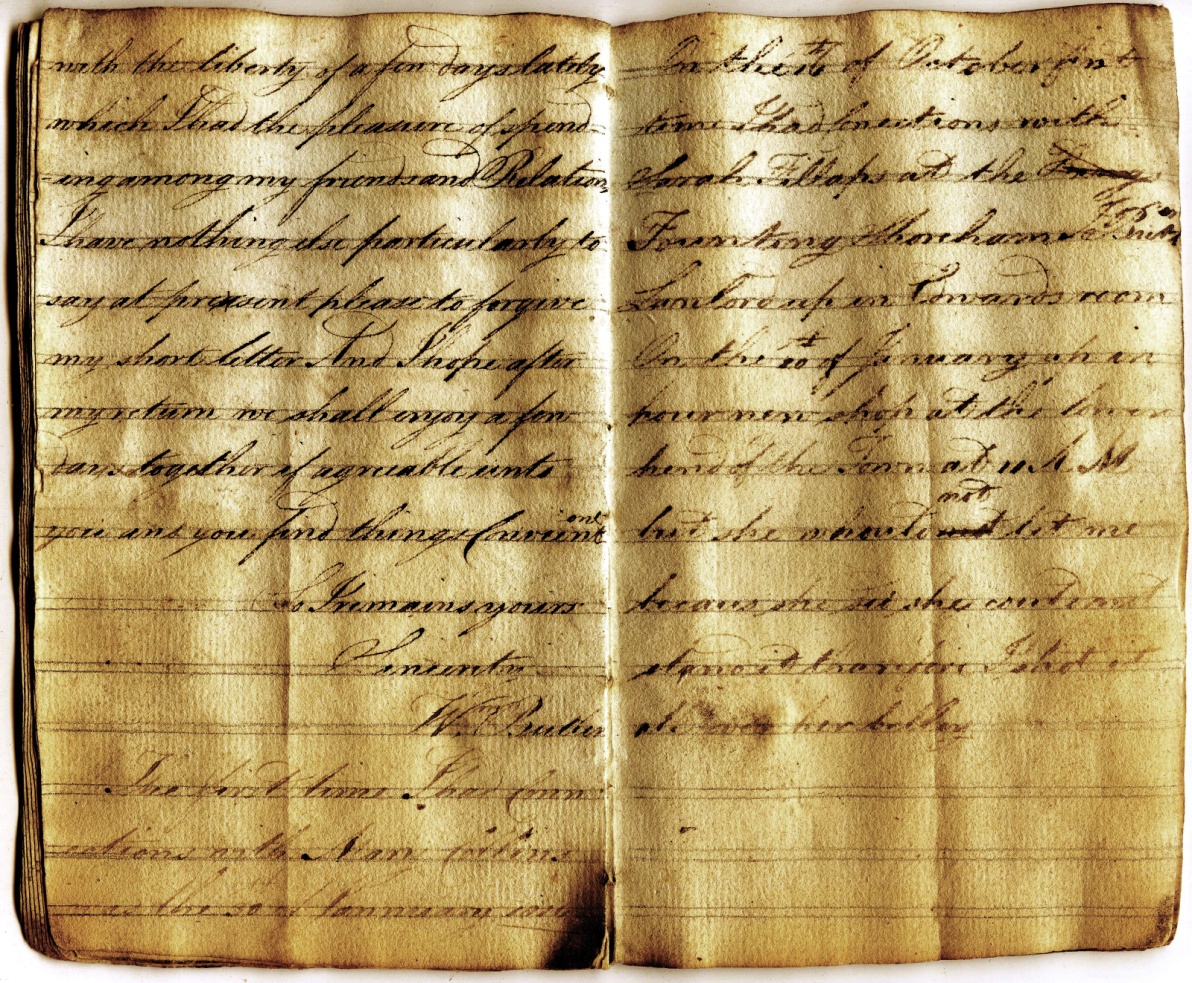
Twenty-second and twenty-third pages (Letter G concluded and notes H)
Acknowledgements
Derek Goss, for the loan of the original letters.
‘The Ships and Mariners of Shoreham’ by Henry Cheal providing the inspiration for the water colour of ‘The Hound’
